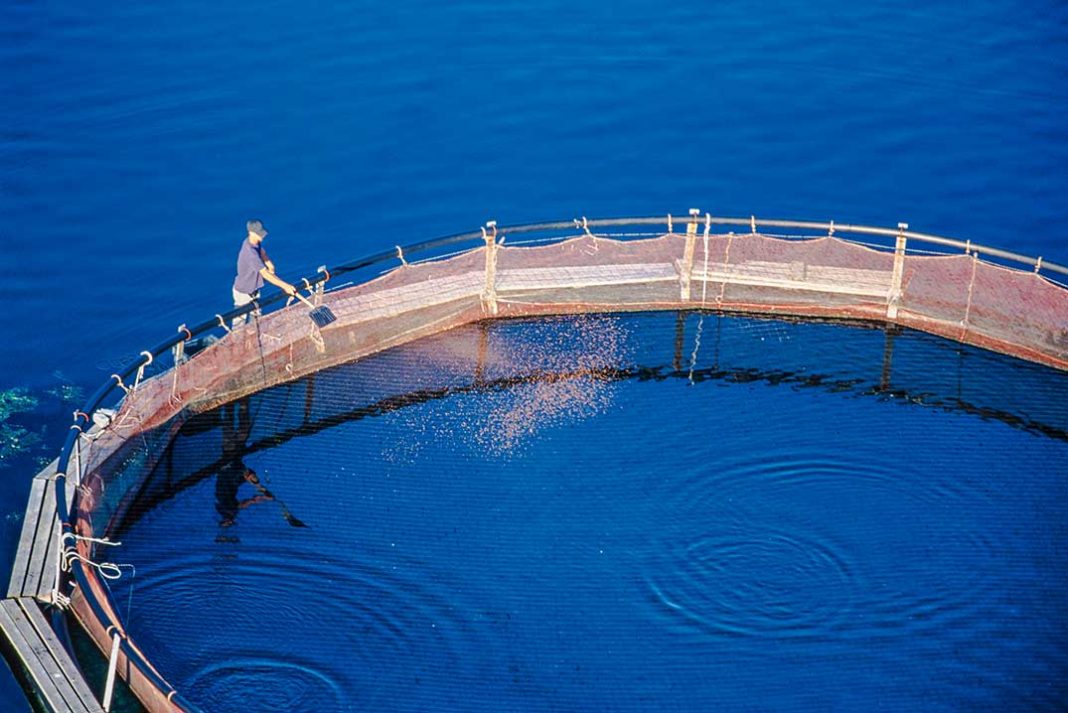Leases changing from 5 to 20 years, province committed to standardizing water quality baseline at all sites
HANOVER – The Ontario government has announced major reforms to net pen aquaculture regulations, a move that finalizes water quality guidelines for open-water aquaculture operations.
“Aquaculture is one the sectors that is most dependent on our ability to keep our waters clean,” said Ontario Minister of the Environment, Conservation and Parks (MECP) Jeff Yurek, at an event held at Cedar Crest Trout Farms in Hanover last Thursday.
“Ontario’s fish farming community is known world-wide for finding some of the most sustainable ways to operate, while ensuring there is minimal impact on the environment,” said Minister Yurek.
The finalized water quality objectives apply to existing operations as well as possible expansions or new operations which will use less than 2,500 metric tonnes of low-phosphorus feed per year—the current maximum feed allocation of Ontario’s largest cage aquaculture operation. Any larger operations will need to be further assessed by the province.
The water quality objectives state that cage aquaculture operations should be carefully located, managed and sized so that the byproducts the operations release into the environment are below the assimilation limits for the water body.
Any byproducts must also meet provincial waste assimilation and non-toxic sediment objectives. All water and sediment quality impacts of aquaculture operations must be contained within the boundaries defined by the farm’s licence in order to minimize local and lake-wide effects that build up over years.
Fish farmers must actively reduce the water and sediment quality effects of their operations by operating their farms in such a way that limits any activities that can lead to dissolved oxygen depletion, phosphorus spikes or sediment toxicity in the water, and to actively monitor these effects.
Water quality policy objectives include a provision that cage aquaculture operators should ensure any waste material from their operation does not cause harmful or nuisance amounts of algae or any aesthetic deterioration of the receiving water body. Total phosphorus amounts within 30 metres of the edge of a cage should not exceed 0.01 mg/L, and the edge of the facility’s permit area should remain at background nutrient concentrations as stated by reference monitoring stations.
MECP currently issues general and site-specific water and sediment quality management conditions to be met when cage aquaculture licences are granted by the Ministry of Natural Resources and Forestry (MNRF). All operators are required to submit their water quality data to MNRF to ensure they are in compliance with the guidelines. MECP has committed to making this data publicly available.
These province-wide guidelines are significant because past practices have seen quality measures varying widely from site to site. These new guidelines ensure that all aquaculture operations in Ontario follow the same standardized procedures.
“Our farmers have been asking for rigorous, standardized guidelines for all Ontario net-pens for years. We want all existing and future farms to play by the same rules so that we can maintain our internationally recognized reputation for growing some of the most sustainable and eco-friendly protein in the world,” said RJ Taylor, co-owner of Cedar Crest Trout Farms and managing director of the Ontario Aquaculture Association.
“Ontario’s largest farms are certified and recognized internationally for their environmental stewardship and best management practices,” said Mr. Taylor.
Also present at the announcement were Bill Walker, associate minister of energy, and MPP Mike Harris, parliamentary assistant to the minister of natural resources and forestry. They both shared their optimism at the economic benefits of the changed regulations.
By having licence terms that run for 20 years rather than the current five, aquaculture operations will be able to attract more long-term investments and be eligible for more loan opportunities.
The sector currently generates economic benefits of more than $122 million in Ontario. Mr. Taylor estimated that aquaculture supports well over 100 jobs on Manitoulin Island alone.
A final change in the new aquaculture regulations is that rather than offering net-pen operations five-year land use permits, they will now be able to get 20-year leases for their sites. In-depth sediment quality tests will be undertaken every five years during a lease.
“All jobs on Manitoulin Island are important. If we can provide sustainable farming, and in turn provide sustainable employment for Manitoulin Island, that’s important,” said Tanya Hughson, who co-manages four Cole-Munro fish farms on Manitoulin Island. Cole-Munro is the second-largest private employer on the Island.
Their lease boundaries also extend beyond the current land-use permits, which were only granted for the space immediately underneath the net-pens. The lease boundaries will be determined based on water flow and the natural distribution of sediment from the operations to ensure the adequate areas are being monitored.
Ms. Hughson said previous comments published in this newspaper by the Georgian Bay Association, an environmental advocacy group, were extremely disheartening to the teams involved in aquaculture on Manitoulin Island.
“That was like a punch in the gut for a lot of our employees because what they were saying was that our jobs don’t matter. But our jobs are to make sure that we don’t do anything wrong to the environment. Any farmer tries to create a healthy environment for their livestock, whether fish or cows. They’re not going to do anything detrimental to the environment because it’s going to be detrimental to their production,” said Ms. Hughson.
She added that aquaculture has enabled her and her Haweater husband to move back to Manitoulin Island, raise a family and support a son starting college—who also wishes to move back to Manitoulin for work after his program.
The Expositor contacted the Georgian Bay Association for its thoughts on the new announcement, but did not receive a response by the early press deadline last Friday. The association has previously been vocal against 20-year licences for net-pen aquaculture and circulated photos of algae in Lake Wolsey from early August which it attributed to the aquaculture operation there.
Mr. Taylor said aquaculturists have been advocating for strict environmental controls and that they are invested in the quality of their ecosystems.
“Our farmers have been asking for rigorous, standardized guidelines for all Ontario net-pens for years. We want all existing and future farms to play by the same rules so that we can maintain our internationally recognized reputation for growing some of the most sustainable and eco-friendly protein in the world,” he said.




